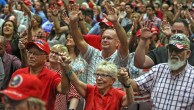by Andrew Kohut, President, Pew Research Center
With the first votes of the 2008 presidential election soon to be cast in the early-decision states, the likely outcome of these contests is more in doubt than in any election cycle in recent history. For the Democratic candidates, the decisive factors are personal and tactical. For Republican contestants, however, the ultimate outcome may be decided more by the relative strength of long quiescent but newly combative ideological elements within the GOP, a struggle that is likely to take longer to play out.
In Iowa, the Democratic race may well hinge on a generation gap that has gotten much less attention thus far than has the gender gap. December polls by ABC/ Washington Post and Newsweek showed Barack Obama not only catching up with Hillary Clinton, but pulling slightly ahead among likely caucus goers. But the internals of the polls suggest that Obama’s lead is indeed a fragile one. In the Newsweek poll, the Illinois senator tops his New York rival by a wide margin among voters who will “probably” vote (40% to 27%), but among those who say that they will “definitely vote” the race is even (31% vs. 32%).
This gap reflects a pattern apparent in both December polls. Obama runs far better among younger voters, who turn out less reliably than older voters. In the Newsweek poll Obama has a 25-percentage point lead among those less than 50 years of age, while Hillary leads by 15 points among those ages 50 and older — a spread wider than the gender gap recorded in Iowa.
For Obama and Clinton — as well as for John Edwards, who is in striking distance of the front runners in most polls — preferences and enthusiasm for the candidates are not particularly linked to judgments about which candidate comes closer to the voter’s position on the issues. The pluses and minuses are personal attributes: Hillary’s experience, electability, and image as a strong leader appeal to her older and somewhat more conservative supporters. Obama’s likeability, compassion and potential to effect change are his strong points with his younger, somewhat more liberal backers in Iowa.
The Democratic race in Iowa is likely to hinge on how well the campaigns can motivate their potential backers to turn out for the complicated and time-consuming caucuses. On the Republican side, the situation is more fundamental, hinging as it does on a potential divide between social and economic conservatives within the party. Mike Huckabee’s rise to the top of the heap in the Iowa polls is a product of overwhelming support from white evangelical Protestants, who make up 47% of likely GOP caucus-goers.
Many Christian conservatives are wary of Romney’s Mormonism as they are also wary of Giuliani’s positions on social issues. The Newsweek poll found only 41% of Iowa evangelicals saying that Mormons are Christians and just 11% saying they are likely to vote for the former Massachusetts governor. And while Rudy Giuliani earns high ratings from Republicans in most places for his ability to deal with terrorism, discomfort with his positions on social issue in states like Iowa is quite apparent. A mid-November ABC/Washington Post poll found just 11% of Iowa Republicans choosing the former New York mayor as the candidate they most trusted to handle social issues and his overall standing among this highly socially conservative electorate reflects that concern.
But that is Iowa and, down the road, perhaps South Carolina as well. In New Hampshire, where Republicans are much more moderate on social issues – a majority is pro-choice – an early December ABC/Washington Post poll found little evidence of Huckabee fever. Romney remained the frontrunner at 37% followed by McCain (20%) and Giuliani (16%). Huckabee garnered the support of only 9% of likely voters in a state where many independents will cast ballots, and just 15% of the probable electorate is composed of evangelicals.
While New Hampshire may be exceptionally moderate, the GOP outlook in the rest of the country falls somewhere between it and Iowa. A nationwide ABC/Washington Post poll taken last week found Giuliani losing ground to Huckabee, although he remained the front runner with the support of 25% of likely voters. Huckabee and Romney tied for second place — with the support of 19% and 17% respectively — closely followed by McCain and Thompson.
But perhaps the most telling finding of that particular poll was that when Republicans were asked which candidate best reflects the core values of the GOP, no consensus whatsoever emerged. Responses were about equally divided among all five of the leading candidates. And that is where the Republicans find themselves — with divides between social conservatives whose acid tests involve positions on abortion and gay marriage, and economic conservatives who may insist on conservative positions on tax policy and size of government. How far Huckabee goes may well be defined by whether economic conservatives find his perceived populism tolerable.
As has been the case in this campaign so far, the shoe is on the other foot when it comes to Republicans and Democrats. The Democrats are much more unified, and their nominee will be the candidate who campaigns the best. Whether an Obama victory in Iowa will lead to an unraveling of Hillary’s continuing huge nationwide lead over her rivals remains questionable. A mid-December Gallup Poll found Clinton with a 45%-to-27% margin over Obama. Any Obama bounce into and out of New Hampshire will have to be substantial to erode such a margin.
For the Republicans, caught in a potentially divisive wrangle, the factors that will determine the winner are far less clear. Coalitions of economic conservatives and libertarians may well take on Huckabee. Should they succeed in cooling down his momentum, which of the other front runners wins the prize will be as much a puzzle as it was before the Huckaboom.
